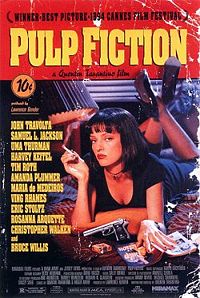|
Samuel
L Jackson
Profiles
Pulp
Fiction


Profiles
John
Travolta Bruce
Willis Samuel
L Jackson Movies
Hollywood
News
Samuel
L Jackson named highest grossing actor - 28th October
2011
The
prolific actor has displaced Harrison Ford, who has
starred in many blockbuster movies including Star
Wars and Indiana Jones.
Jackson,
62, had a slow start in Hollywood, with a five year
gap between his first film, Together for Days, which
he made in 1972, and The Displaced Person, which was
released in 1977.
His
career picked up in the late eighties, with small
appearances in Eddie Murphy's Coming to America and
Martin Scorcese's Goodfellas, but his star did not
rise until his appearance as a crack addict in Spike
Lee's Jungle Fever.
Since
then Jackson has proven a box office juggernaut, appearing
in more than a hundred films including Die Hard with
a Vengeance, Pulp Fiction, Snakes on a Plane and The
Incredibles.
The
1993 film Jurassic Park earned $855 million worldwide,
while the Star Wars prequels took in a whopping $2.2
billion.
Appearing
frequently in action, comedy and drama films, Jackson
has made four films this year, as well as making his
Broadway debut as Martin Luther King Jr in The Mountaintop.


Pulp
Fiction is a 1994 film by director Quentin Tarantino,
who cowrote the film with Roger Avary. A crime
drama with a nonlinear storyline, the film is
known for its rich, eclectic dialogue, its ironic
mix of humor and violence, and its host of cinematic
and pop culture references. The film was nominated
for seven Oscars, including Best Picture; Tarantino
and Avary won for Best Original Screenplay. It
was also awarded the Palme d'Or at the Cannes
Film Festival. A major commercial success, it
revitalized the career of its leading man, John
Travolta, who received an Academy Award nomination,
as did costars Samuel L. Jackson and Uma Thurman.
The
film's title refers to the pulp magazines and
hardboiled crime novels popular during the mid-20th
century, known for their graphic violence and
punchy dialogue. Pulp Fiction is self-referential
from its opening moments, beginning with a title
card that gives two dictionary definitions of
"pulp". The plot, in keeping with most
of Tarantino's other works, is nonlinear. The
picture's self-reflexivity, unconventional structure,
and extensive use of homage and pastiche have
led critics to describe it as a prime example
of postmodern film. Pulp Fiction is viewed as
the inspiration for many later movies that adopted
various elements of its style. The nature of its
development, marketing, and distribution and its
consequent profitability had a sweeping effect
on the field of independent cinema. A cultural
watershed, Pulp Fiction's influence has been felt
in several other popular mediums. (Credit:
Wikipedia).
Outrageously
violent, time-twisting, and in love with language,
Pulp Fiction was widely considered the most influential
American movie of the 1990s. Director and co-screenwriter
Quentin Tarantino synthesized such seemingly disparate
traditions as the syncopated language of David Mamet;
the serious violence of American gangster movies,
crime movies, and films noirs mixed up with the wacky
violence of cartoons, video games, and Japanese animation;
and the fragmented story-telling structures of such
experimental classics as Citizen Kane, Rashomon, and
La jetée. The Oscar-winning script by Tarantino
and Roger Avary intertwines three stories, featuring
Samuel L. Jackson and John Travolta, in the role that
single-handedly reignited his career, as hit men who
have philosophical interchanges on such topics as
the French names for American fast food products;
Bruce Willis as a boxer out of a 1940s B-movie; and
such other stalwarts as Harvey Keitel, Tim Roth, Christopher
Walken, Eric Stoltz, Ving Rhames, and Uma Thurman,
whose dance sequence with Travolta proved an instant
classic. ~ Leo Charney, Rovi
Media
Man does not represent Samuel L Jackson, Pulp Fiction,
Quentin Tarantino or Miramax Films
|



